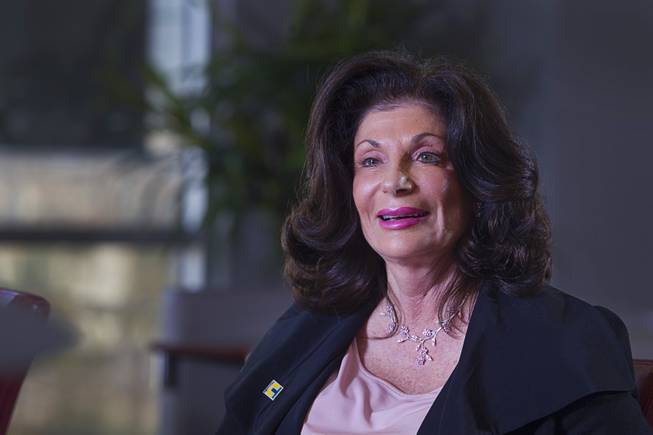
Former U. S. Congresswoman Shelley Berkley (D-NV) speaks about the need for Nevada residency programs during an editorial board meeting at the Las Vegas Sun offices Thursday, Feb. 20, 2014. Berkley is the new CEO and senior provost of the Touro College and University system in Nevada and California.
Friday, Feb. 21, 2014 | midnight
Former Democratic Congresswoman Shelley Berkley told the Las Vegas Sun editorial board on Thursday that she hasn't taken a position on the UNLV medical school.
The UNLV alumna who recently became CEO and senior provost of Touro University Nevada said she wants to see her alma mater “grow and succeed and have a national reputation.”
However, Berkley acknowledged the high costs of starting and maintaining a medical school.
Health care consultant Tripp Umbach estimates that constructing an UNLV medical school could cost $80 million. Once finished, however, the UNLV medical school could have an annual economic impact of around $1.2 billion, according to the consultants.
Instead of pouring millions of dollars into creating a new medical school, Berkley said Nevada should consider ways to create more hospital and health clinic residencies for current medical students. Research shows that more than two-thirds of medical school graduates stay in the state where they complete their residencies.
“It would seem to me at this moment in time the best expenditure of our state tax dollars if we want to improve the medical system is to create more residency programs,” Berkley said. “It doesn’t do us any good to graduate more medical students if we are educating them to go to other states.”
Drawing on her political connections from her 30-years of public service as a regent, legislator and congresswoman, Berkley said she plans to lobby policymakers to increase the number of residencies in Nevada.
Touro University Nevada has a partnership with the Valley hospital system, which offers nearly 90 residencies to medical students across the country. Touro graduates 135 students every year.
“You see the shortfall,” Berkley said. “We don’t have a medical student shortage in this state. We have a doctor shortage in this state.”
The lack of residencies in Nevada stems from federal caps on creating new residencies and cuts on federal reimbursements for the programs. A residency program could cost hospitals upwards of $100,000 per resident.
Berkley said she plans to work with state legislators to create a statewide fund that would reimburse hospitals and clinics for creating new residencies.
“If we have $50 million to create a medical school, then we certainly have $20 million to ensure that we have a steady supply of doctors that are desperately needed,” Berkley said.
Further, Berkley said she hopes to work with Nevada’s congressional delegation to solve the problem at the federal level.
U.S. Rep. Joe Heck, R-Nev., said he is considering introducing legislation that would reallocate residency spots from states that have an overabundance of residencies to meager states like Nevada. A similar reallocation of residencies occurred about a decade ago, he said.
“Slots are allocated, but not filled,” Heck said. “Those empty slots are just sitting there across the country.”
Heck also said he is studying alternative locations where medical students can complete their residencies and new models for funding residencies.
Berkley said she will do anything to help Heck and other policymakers create more residencies in Nevada, which has one of the lowest doctor-to-resident ratios in the country.
“Right now, we’re educating students to leave,” Berkley said. “We need to educate students to stay.
“We have to fill that gap. We have no time to waste.”

Join the Discussion:
Check this out for a full explanation of our conversion to the LiveFyre commenting system and instructions on how to sign up for an account.
Full comments policy